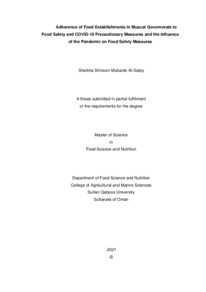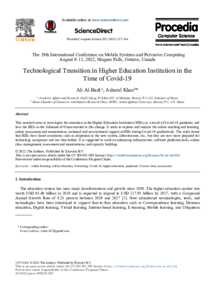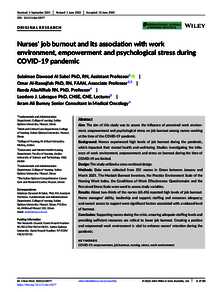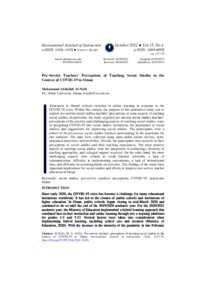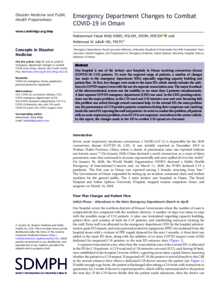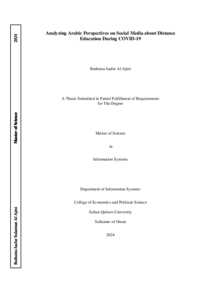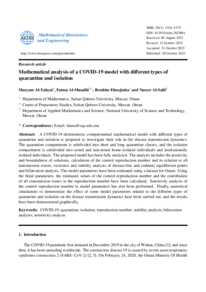Document
Adherence of food establishments in Muscat Governorate to food safety and COVID-19 precautionary measures and the influence of the pandemic on food safety measures.
Other titles
التزام المؤسسات الغذائية بمحافظة مسقط بإجراءات سلامة الغذاء والوقاية من مرض كوفيد 19- وتأثير الجائحة على إجراءات سلامة الغذاء
Publisher
Sultan Qaboos University.
Gregorian
2021
Language
English
Subject
English abstract
Although the risk of transmission the novel coronavirus from food and
food package is very low, the COVID-19 positive cases have raised in food
processing, manufacturing and agriculture workplaces. That is possibly due to
improper complying with the global precautionary measures decelerated by
global authorities. Therefore, this study aimed to evaluate the adherence of food
establishments in Muscat Governorate, the Sultanate of Oman, to the
recommended food safety precautionary measures and to investigate the
change imposed by the pandemic. The data was collected from October to
December 2020 through face-to-face interview with facility person-in-charge
(PIC) and on-site observational inspections. The questionnaire was developed
based on COVID-19 international guidelines such as World Health Organization,
Food and Drug Administration and Centers for Disease Control and Prevention.
The questionnaire consisted of thirty closed-ended and five points Likert scale
questions divided into five main sections: Establishment details, symptoms
monitoring, personal hygiene, surface cleaning and disinfecting and physical
distancing. The on-site observational inspections included activities related to
symptoms monitoring, personal hygiene, food contact surface disinfection and
physical distancing. A total of 25 first class restaurants, 17 hotel catering and
45 food retailers were included in this study based on COVID-19 risk, which
represent 37.7%, 34.7% and 42.1% of total establishments' numbers in Muscat
governorate respectively. The study found a lack in adopting Food System
Management systems (FSMS) in food retailers (0.0%), restaurants (0.0%), and
hotels catering (17.6%). A reduction in customer numbers was found and the
highest reduction was found in the hotels caterings (59.6 ± 16.09) followed by
restaurants (32.3 ± 37.41) and retailers (29.0 ± 25.98). A lack in hand washing
basins was observed in food retailers (46.7%) compared to restaurants (96.0%)
and hotels catering (88.2%). No significant change in hand washing stations
before and after pandemic. In addition, a lack in cleaning and disinfecting
practises of food contact (26.7% and 31.1%) and noncontact (31.1% and 68.9%)
surfaces in food retailers before and after pandemic respectively. The results
showed that 100% of hotels catering, 96.0% of retailers and 76.0% of
restaurants have assessed the staff and customers for COVID-19 symptoms
before entering the facility. Fever, dry cough and headache were the most
known symptoms among facilities' person-in-charge, while rash on skin and
conjunctivitis were least known. The usage of recommended hand sanitizers and
V
face masks were increased significantly in food retailers, restaurants and hotels
catering (p < 0.05) in post COVID-19. The most used social distance measures
were floor spacing markers or stickers (88.9%, 84.0% and 11.8%) and barriers
between each employee (68.9%, 40.0% and 47.1%) in retailers, restaurants and
hotels catering respectively.
The overall adherence level of the food establishments toward health and
symptoms monitoring, physical distancing and face mask wearing was relatively
high. However, the adherence level of food retailers towards surfaces cleaning
and disinfection and hand hygiene measures were relatively low. To improve the
adherence towards the recommended COVID-19 safety measures, it is vital to
follow Good Manufacturing Practices and maintain accessible and fully equipped
hand washing basins.
Member of
Resource URL
Arabic abstract
عد خطر الاصابة بفيروس كورونا المستجد من خلال الطعام و عبوات الطعام والغذاء منخفض جدا. ومع ذلك، فقد زادت الحالات الايجابية لكوفيد19- في أماكن العمل الخاصة بتجهيز الاغذية والتصنيع والزراعة. هدفت هذه الدراسة إلى تقييم مدى التزام المؤسسات الغذائية في محافظة مسقط بسلطنة عمان بالاجراءات الاحترازية الموصي بها لسلامة الغذاء. تم جمع بيانات الدراسة في الفترة من أكتوبر إلى ديسمبر2020 وذلك من خلال المقابلة الشخصية مع ومراقبة المنشآت. تم تطوير الاستبيان بنا ًء الموظف المسؤول في المنشأة ومن خلال عمليات تفتيش على الارشادات سؤالا مغلقً الدولية لكوفيد.19- يتألف الاستبيان من 31 ا ومقياس ليكرت الخماسي مقسمة إلى خمسة أقسام رئيسية: تفاصيل المنشأة، ومراقبة الاعراض، والنظافة الشخصية، وتنظيف الاسطح، والتعقيم، والتباعد الجسدي. تضمنت عمليات التفتيش في الموقع أنشطة تتعلق بمراقبة الاعراض، والنظافة الشخصية، وتطهير الاسطح المالمسة لطعام، والتباعد الجسدي. تم تضمين 25 مطعًما من من مطاعم الدرجة الاولى، و17 مطعًما للتموين في الفنادق، و45 تاجر تجزئة للمواد الغذائية للمشاركة في هذه الدراسة بنا ًء على مخاطر كوفيد،19- والتي تمثل ٪37.7 و ٪34.7 و ٪42.1 من إجمالي أعداد المؤسسات في محافظة مسقط على التوالي. تكشف هذه الدراسة عن وجود نقص في اعتماد نظام إدارة سالمة الغذاء لدى بائعي الاغذية بالتجزئة )٪0.0(، والمطاعم )٪0.0(، والفنادق )٪17.6(. كما كشفت الدراسة انخفاض في عدد الزبائن؛ الانخفاض الاكبر لوحظ في تموين الفنادق )59.6 ± 16.09( تليها المطاعم )32.3 ± 37.41( وتجار التجزئة ) 29.0 ± 25.98(. لوحظ نقص في مغاسل غسل الايدي عند تجار التجزئة لللأغذية )٪46.7( مقارنة بالمطاعم )٪96.0( والفنادق )٪88.2(. أشارت الدراسة إلى عدم وجود تغيير كبير في عدد محطات غسل اليدين قبل وبعد الجائحة. بالاضافة إلى ذلك هناك نقص في ممارسات التنظيف والتطهير للأسطح المالمسة )٪26.7 و٪31.1( والغير ملامسة الاغذية )٪31.1 و٪68.9( عند بائعي المواد الغذائية قبل وبعد الجائحة على التوالي. أظهرت النتائج أن جميع مؤسسات تموين الفنادق، و٪96.0 من تجار التجزئة و٪76.0 من المطاعم تقوم بمراقبة وتقييم الوضع الصحي وأعراض كوفيد19- للموظفين والزبائن دائما قبل الدخول إلى المنشأة. حيث أن الحمى والسعال الجاف والصداع من أكثر الاعراض المعروفة من قبل مسؤولي المؤسسات، بينما الطفح الجلدي والتهاب الملتحمة هي أقل الاعراض المعروفة. تمت زيادة استخدام معقمات الايدي وأقنعة الوجه الموصي بها بشكل كبير لدى تجار التجزئة لألغذية والمطاعم والفنادق )0.05> P )في فترة الجائحة. وجد أن مقاييس التباعد الاجتماعي الاكثر استخدا ًما هي عالمات التباعد والملصقات في الارضيات )٪88.9 و٪84.0 و٪11.8( والحواجز بين كل موظف )٪68.9 و ٪40.0 و٪47.1( في متاجر التجزئة والمطاعم والفنادق على التوالي. كان مستوى التزام المؤسسات الغذائية العام تجاه مراقبة الصحة والاعراض، والتباعد الجسدي وارتداء قناع الوجه مرتفعًا نسبيًا. ومع ذلك، كان مستوى التزام تجار الاغذية بالتجزئة تجاه تنظيف الاسطح وتطهيرها وتدابير نظافة اليدين منخفضا نسبيًا. لتحسين الالتزام بتدابير السلامة الموصي بها لـكوفيد،19- من الضروري اتباع ممارسات ( والحفاظ على مغاسل غسل الايدي التي يمكن الوصول إليها والمجهزة تجهي ًزا كامالً التصنيع الجيدة )GMP .
Category
Theses and Dissertations

